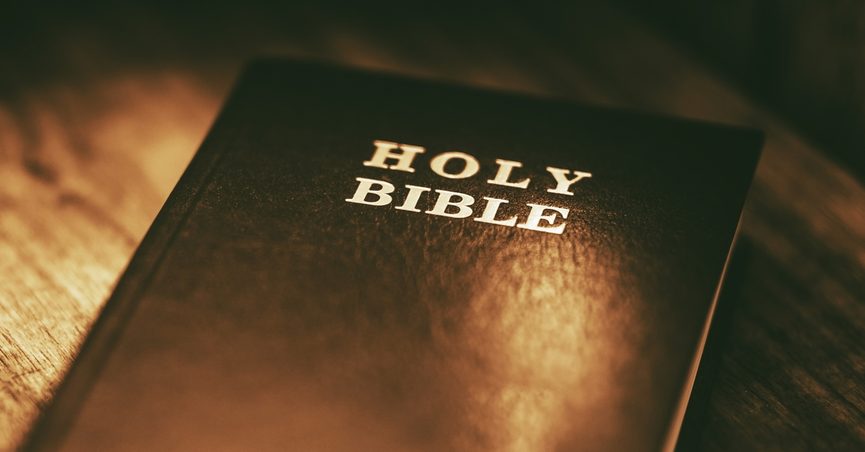Catechism Question 2

Question 2: Where do we learn how to glorify God and enjoy Him forever?
In His Word, the Bible.
Focus and Purpose of this Question
In this question, we are giving the basis for everything taught in the entire catechism. It is in the Scripture that we learn Who God is, who we are, what God desires of us, and how to fulfill that call. Although other things – the Church, Creeds, even this catechism – can be very helpful, the only final authority given by God to humanity is the Bible. Everything – including this catechism – must be tested against the teaching of God’s Word.
For this reason, the catechism will have a number of questions regarding the Scripture, its structure, and the actual names and order of the biblical books. Additionally, we will give Scriptures to demonstrate the truth of the answers being given to each question in the catechism. Thus, the ultimate purpose of the catechism is to lead us to God’s Word that we might know, glorify and enjoy God – now and forever.
Additional Questions:
What book tells us how to glorify God?
Where do we find out how to glorify God?
What guide has God given to teach us how to glorify and enjoy Him forever?
What authority has God given to teach us how to glorify and enjoy him?
What is the only final authority on how we can glorify and enjoy God?
Scripture References:
2 Timothy 3:16-17
All Scripture is God-breathed and is useful for teaching, rebuking, correcting and training in righteousness, 17 so that the man of God may be thoroughly equipped for every good work.
Deuteronomy 4:5
See, I have taught you decrees and laws as the LORD my God commanded me, so that you may follow them in the land you are entering to take possession of it.
Deuteronomy 29:29
The secret things belong to the LORD our God, but the things revealed belong to us and to our children forever, that we may follow all the words of this law.
Acts 17:11
Now the Bereans were of more noble character than the Thessalonians, for they received the message with great eagerness and examined the Scriptures every day to see if what Paul said was true.
1 John 1:1-4
That which was from the beginning, which we have heard, which we have seen with our eyes, which we have looked at and our hands have touched–this we proclaim concerning the Word of life. 2 The life appeared; we have seen it and testify to it, and we proclaim to you the eternal life, which was with the Father and has appeared to us. 3 We proclaim to you what we have seen and heard, so that you also may have fellowship with us. And our fellowship is with the Father and with his Son, Jesus Christ. 4 We write this to make our joy complete.
Questions for Further Discussion:
Is the Bible sufficient for us to know how to glorify and enjoy God?
Does this mean that we can not learn truth from other sources such as nature, history, literature, science, etc? What is the relationship between these and the Scripture?
If the Scripture is the only final authority for discovering how to fulfill our ultimate purpose, is it important for the Scripture to be clear, inerrant, and sufficient? Why?
If the Scripture is the only final authority for learning how to glorify and enjoy God, what part should it have in our daily lives?
Additional Information:
This question is based on question 2 from the Westminster Shorter Catechism. Any resources you find on Westminster catechism will have a good discussion on this question.
Wayne Grudem, Systematic Theology, Chapters 2-8, discuss the nature, clarity, inerrancy, and sufficiency of God’s Word in depth.
For additional information, see the teachings “Our Instruction Manual: The Bible” (July 14, 2019) by Bret Hicks, “The Treasure of God’s Word” (January 10, 2010) by Bret Hicks, and “The Sufficiency of Scripture” (January 24, 2010) by Bret Hicks. For a full overview on the development of the Bible, including the processes of inspiration, determining which books were part of Scripture, how Scripture was copied and transmitted, and how translation works, see the BRCC seminar “How I Got My Bible.”
Suggested Worship Song:
How Firm A Foundation (John Rippon, 1787)
How firm a foundation, ye saints of the Lord,
Is laid for your faith in His excellent Word!
What more can He say than to you He hath said,
You, who unto Jesus for refuge have fled?
Fear not, I am with thee, O be not dismayed,
For I am thy God and will still give thee aid;
I’ll strengthen and help thee, and cause thee to stand
Upheld by My righteous, omnipotent hand.
When through the deep waters I call thee to go,
The rivers of woe shall not thee overflow;
For I will be with thee, thy troubles to bless,
And sanctify to thee thy deepest distress.
When through fiery trials thy pathways shall lie,
My grace, all sufficient, shall be thy supply;
The flame shall not hurt thee; I only design
Thy dross to consume, and thy gold to refine.
The soul that on Jesus has leaned for repose,
I will not, I will not desert to its foes;
That soul, though all hell should endeavor to shake,
I’ll never, no never, no never forsake.
